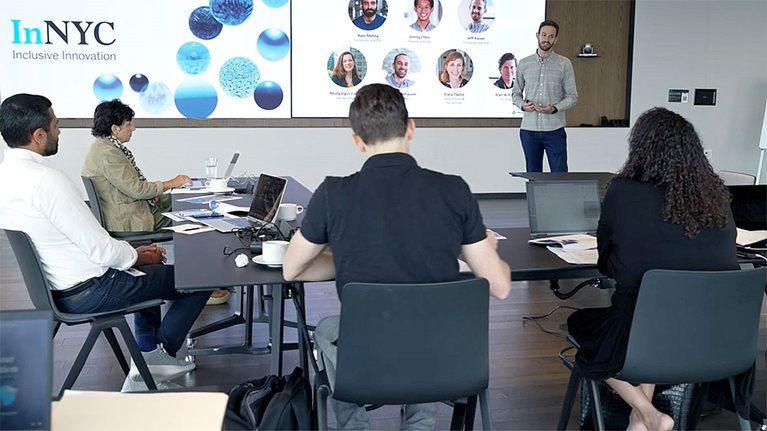When Isabel Rafferty Zavala began working with McKinsey on growing her start-up, she was a little anxious.
She had a lot at stake as founder and CEO of Canela Media, a streaming platform for Hispanic and Latino audiences. While she had started other companies, she knew this one would be a much bigger undertaking—and risk—one she took on with her husband, Michael Rafferty, COO of Canela.
“I told Michael, ‘Are you up for this? If we fail, we’ll be sleeping at our parents’ places with our four kids,’” she says with a laugh.
Founded in 2019, Canela was one of few minority- and women-owned companies to secure venture-capital funding to help it grow. Following its series-A financing, Canela experienced whirlwind growth that’s been difficult to keep up with. That’s what attracted Isabel to McKinsey’s InNYC accelerator, a pro bono program that provides a suite of firm resources to New York City tech start-up founders from underrepresented groups. The program takes an expansive view of the underrepresented community to include, socio-economic status, first generation college students, LGBTQ+ people, and women. It is focused on bringing together start-ups with inspiring concepts that have faced systemic barriers and opportunity gaps in the past. Initially, Isabel was hesitant to place her baby in unfamiliar hands.
“I thought, ‘Let’s see,’” she says, “but McKinsey earned our trust quickly. I felt at peace for the first time in a while because I had more clarity about our future.”
Economies are stronger when growth opportunities are created for everyone, yet women, people of color, and LGBTQ+ business founders continue to face barriers, such as lack of funding and access to professional networks. These founders push forward, often without support, shouldering considerable emotional, operational, and financial burdens.
InNYC, a program out of McKinsey’s New York office, aims to accelerate inclusive innovation in technology. To bring the tech start-up playing field closer to level, the New York office hosted its inaugural InNYC “cohort pitch day,” where nine finalists presented tech platforms poised to make a difference in their communities. From there, three start-ups—all founded by women of color—went on to receive 12 weeks of dedicated firm resources: Canela, the Hispanic and Latino streaming platform, Goalsetter, a family-oriented savings, investing, and financial education app, and Landit, a career-development platform aimed at increasing diversity.
Parvathy Menon, an engagement manager who led McKinsey’s work with the start-ups, says that despite the innovative products and successes, the founders have had trouble securing corporate sponsorships, making deals, building networks, and more.
“It truly showed how much factors like race and gender skew the playing field in a way that is hard to comprehend on a daily basis,” she says. “So not only did we work on a wide variety of business challenges, but we were there with them through real emotional highs and lows.”

Focusing on long-term growth
Canela launched not long before the pandemic—a turbulent time for a streaming platform, when viewership spiked, but advertisers were hesitant to spend. Despite these challenges, in the blink of an eye, Isabel and Michael went from being hands on in the work to growing their departments and figuring out HR onboarding; from just nine employees to 110.
“With fast growing companies, you don’t have time to sit back and analyze the business, and you start to get separated from the baseline work,” says Michael.
Working with McKinsey, they codified an onboarding process to ease growing pains in the short term, refined the equity story for the medium term, and performed an IPO readiness assessment and five-year charting for the long term.
“They organized our brains,” says Isabel.
Lisa Skeete Tatum, Founder and CEO of Landit, a personalized coaching and career pathing platform to increase the success of women and diverse groups, came into the program with massive opportunity in front of her—and wanted McKinsey to help her seize it. Having secured contracts with Fortune 50 companies, global HR companies and smaller organizations, she needed playbooks for scaling.
“As a start-up we were trying to figure out how to successfully navigate and meet the major demand we were experiencing,” Lisa says. “How do we do that and not drown in the process?”
She found that in her short three months in the program, everything changed. She gained quick access to experts who created expansion levers such as pricing; identified customers’ future needs for the changing workplace through case studies; strengthened the impact of her communication with customers through increased clarity of her business impact; and accelerated her team’s work by bringing them all in for strategy sessions.
“Connecting the dots of the opportunity we’d built for ourselves with McKinsey’s global experience—that was invaluable. It was company making,” says Lisa.
As a Black woman founder, the deck is stacked against you. McKinsey brought a few more cards my way in a short period of time. It was liberating.
Learning from the founders
Tanya Van Court, CEO and Founder of Goalsetter, the financial literacy app for children, says that her experience in the accelerator led her to break through longstanding challenges quickly and make major decisions, such as pursuing growth through bank and school partnerships rather than as an employee benefit.
Brian Clement, a McKinsey associate, worked with Tanya throughout her 12-week engagement and says it was unlike any other experience at the firm, largely due to Tanya’s dedication and one-woman scrappiness. The juxtaposition of sky-high possibilities and existential crises made for a roller-coaster experience, pushing Brian to find solutions he’d never had to before. He credits Tanya with the success.
“I was extremely impressed,” says Brian. “I’d never seen one person balance so much while setting such a positive tone for her staff.”
Working with her also exposed Brian, a White man, to the experiences and difficulties being a Black woman founder faced. “There were many emotional ups and downs, and Tanya was so generous in talking about her experience with race and gender as a founder,” he says. “I learned a lot.”
Spreading that awareness and building on it might have been most important to Tanya. “As a Black woman founder, the deck is stacked against you. McKinsey brought a few more cards my way in a short period of time,” says Tanya. “It was liberating.”
The success of the inaugural cohort has Parvathy and others hard at work on refining the program—2023 program applications are open now. “There’s been so many great learnings,” says Parvathy. “We're going to be even more impactful now.”

